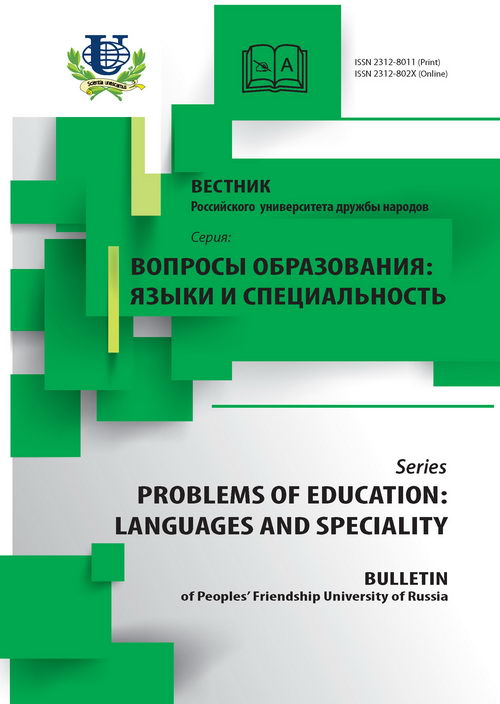No 2 (2015)
- Year: 2015
- Articles: 12
- URL: https://journals.rudn.ru/polylinguality/issue/view/808
EDITORIAL
SPANISH VARIABILITY IN FLORIDA
Abstract
This essay focuses on some specific features of Cuban American Spanish in Miami, Florida.Analyzes someinterstructural, cultural and idiosyncratic parameters of the dialect that arises from the national Cuban variant outside the territory of Cuba and under the impact of the American English.
Polylinguality and Transcultural Practices. 2015;(2):7-14
 7-14
7-14


 15-22
15-22


LANGUAGE POLICY IN NIGERIA
Abstract
The article deals with the sociolinguistic situation and language policy in Nigeria, which is very complex because English is official language but there are also more than 500 local languages. Pidgin English is considered to be a means of inter-ethnic communication.
Polylinguality and Transcultural Practices. 2015;(2):23-28
 23-28
23-28


VERBAL AND NON-VERBAL AGGRESSION IN RUSSION AND ENGLISH COMMUNICATIVE BEHAVIOR
Abstract
The article is devoted to semantic analysis of lexical units meaning the ways of objectification of verbal and non-verbal aggression as a specific form of behavior in Russian and the British national variant of English. The common and ethnicically specific estimation forms of the described phenomenon were emphasized.
Polylinguality and Transcultural Practices. 2015;(2):29-35
 29-35
29-35


PHENOMENOLOGY OF ORATORICAL DISCOURSE OF LATIN AMERICAN LEADERS
Abstract
The article examines the discursive strategy of building identification with political and historical figures in the oratorical discourses of populist leaders in Latin America. On the example of the populist”bolivarizm” movement personalized by Hugo Chavez, target selection of case units, which provides controlled effect on the listener, is considered.
Polylinguality and Transcultural Practices. 2015;(2):36-39
 36-39
36-39


TYPOLOGY OF PROFESSIONAL COMMUNICATIVE SITUATIONS
Abstract
The article discusses psycholinguistic aspects of professional communicative situations in collective activities divers specialists. Professional communicative situation is characterized from the point of view of use in the speech collectives of various professional sublanguages. The author allocates the types of professional communicative situations on criterion use by employees in professional speech subcode switching.
Polylinguality and Transcultural Practices. 2015;(2):40-56
 40-56
40-56


EMOTIONALITY AS A TRAIT OF THE MEXICAN CHARACTER
Abstract
The article analyses cultural Mexican specificities on the basis of the popular telenovela “Porque el Amor Manda” which can be translated to English as “Love Rules”. The main aspect discussed in this piece of writing concerns one of the most representative traits of the Mexican character - emotionality. The investigation is based on concrete episodes of the mentioned soap opera.
Polylinguality and Transcultural Practices. 2015;(2):57-60
 57-60
57-60


PROFESSION-ORIENTED ENGLISH LANGUAGE TRAINING FOR RUSSIAN COSMONAUTS WITHIN THE FRAMEWORK OF THE INTERNATIONAL SPACE STATION FLIGHT PROGRAMM TRAINING
Abstract
The article analyses specific features of profession-oriented English language training for Russian cosmonauts in the Gagarin Cosmonaut Training Center and offers description of the system of language training flow organization that allows to obtain the best results.
Polylinguality and Transcultural Practices. 2015;(2):61-67
 61-67
61-67


TEACHING PUNCTUATION OF A FOREIGN LANGUAGE
Abstract
This article explores the teaching of punctuation in a foreign language class. Being an essential part of every language, punctuation is often omitted in foreign language teaching materials. In this article is explained the very core of the problem and are suggested some models of how can punctuation be included in the foreign language class materials.
Polylinguality and Transcultural Practices. 2015;(2):68-71
 68-71
68-71


TECHNOLOGY OF STUDENT - CENTERD LEARNING BY METHOD OF PROJECTS
Abstract
Project-based learning is the most adequate technology, learner-centered education, making it possible to use modern approaches to education, to enhance pedagogical support, socialization, inclusion of students in different environments, as well as student-centered situation in the process of education of students by means of the subject “foreign language.”
Polylinguality and Transcultural Practices. 2015;(2):72-77
 72-77
72-77


MECHANISMS OF IMPROVEMENT PERSON’S STRESSRESISTANCE WITH YOGA
Abstract
In modern society, amplified effect on humans of different stress factors - such as an increase in the tempo of modern life and the amount of information received, Virtualization of society, changes in social life, environmental degradation, natural and man-made disasters, worsening the political situation in the world economic crisis and etc.
Polylinguality and Transcultural Practices. 2015;(2):78-84
 78-84
78-84


NAShI AVTORY
Polylinguality and Transcultural Practices. 2015;(2):85
 85
85















